Editor’s note: Election Day is Tuesday, Nov. 5. Stay informed with OPB on the presidential race, key congressional battles and other local contests and ballot measures in Oregon and Southwest Washington at opb.org/elections.
Joey Schuler fondly recalls visiting his mom at her office in downtown Portland’s KOIN Tower as a kid. He grew up just a few miles west of Portland and even envisioned moving downtown when he was an adult. That’s no longer the case.
“It’s not an option for me anymore, the safety issue is too big of an obstacle for me,” said Schuler, 19, who graduated from Jesuit High School in the spring. “The tents, the drug use… it feels so much worse than when I was a kid.”

Phil Wheeler and his dog, Nico, share a moment outside his recreational vehicle in Clackamas County on Sept. 20, 2024. Wheeler and his wife, and Nico, recently had to move again after Clackamas County removed people living on the streets on Clackamas Road. The couple had been living there for about two months.
Joni Land / OPB
Schuler is one of hundreds of Gen Z and Millennial Oregonians surveyed in a poll by DHM Research commissioned by OPB in August who identified homelessness as the state’s top problem. Of the 600 voters 40 and under polled, most ranked homelessness as their top issue, with housing affordability as a distant second.
Despite their political and demographic differences, respondents share a similar sense of urgency to address the state’s homelessness crisis. Yet they have different ideas about how elected officials should tackle the problem – and what success looks like. Many see the upcoming election as a way to send a message.
“Addressing homelessness, that’s one of the main factors driving me to vote,” said Schuler, who will vote for the first time this November.
Related: What you need to know about voting in Oregon and Southwest Washington
Schuler is registered as a nonaffiliated voter, and identifies as a moderate. He wants to see a clear plan from candidates on how to address the state’s sprawling homelessness problem. Asked what would make him feel like a plan is working, he is unequivocal: “Seeing less people living outside.”
Dannielle Lowe, a self-described liberal who is a nonaffiliated voter in Beaverton, agrees.
“Less people unsheltered, that would be an indicator of it getting better,” said Lowe, 38, who works in downtown Portland and also ranked homelessness as the state’s top issue. “For me, it’s the most visible problem. That’s why it’s the one I think about the most.”
This doesn’t come as a shock to political science experts. According to DHM Research, homelessness has consistently been named Oregon’s top issue in statewide polls for the past five years.
Chris Shortell, a political science professor at Portland State University, said it’s no surprise that homelessness is a top concern for young people. He said that voters are going to care more about issues that they are regularly reminded of, like the tent they walk past daily on the way to work or news stories they see on rising homelessness. This can be exacerbated by perceived inaction.
“We normally expect when there is a highly visible issue, there would be efforts for elected officials to address that sooner,” Shortell said. “But the pandemic short-circuited that normal dynamic.”
He pointed to the period in which encampment sweeps were paused during the COVID-19 pandemic, and the fact that the financial strains of the pandemic pushed more people into homelessness.
Candidates can tap into this dissatisfaction by promising to address visible homelessness, he said.
“The problem is that, from a policy perspective, that might not be the best solution,” said Shortell. “Sweeping homelessness under the rug is not solving homelessness. But there’s a political incentive to make those things less visible even if you genuinely want to make the policy area better.”
Related: Issues important to Oregon voters
Lowe, the Beaverton respondent, worries about politicians focusing too much on removing tents instead of the systemic issues that lead to homelessness. She thinks an increase in housing, paired with investments in addiction and mental health treatment programs, is the best way forward. But she’s not convinced that it’s entirely up to elected officials to solve.
“I think it’s easy to say it’s the government’s responsibility to fix it,” Lowe said. “But it’s all of our jobs to fix it. The reality is we all do better when our homeless population is doing better.”
Most people polled who marked homelessness as the state’s top problem lived in the Portland metro area, where the state’s population of unsheltered people is most concentrated. But others in more rural areas have begun to feel its impact.
Related: Listen to 'OPB Politics Now'
Peyton McLouth, who lives in the 1,200-person town of Athena in Umatilla County, about 20 minutes northeast of Pendleton, said homelessness is always on his mind.
“I never used to see homeless people here, but now I see people in misery every day driving through town,” said McLouth, a 20-year-old registered Independent who responded to OPB’s poll and described his political views as “moderate.”
In his small, tight-knit community, he said that “everyone knows everyone,” including those without a home. His voice cracked as he recalled distributing blankets to people living outside earlier this year.
“It hurts me to my core that this is happening to people I know,” McLouth said.
He said the state’s homeless crisis motivates him to vote. But, like Lowe, he doesn’t believe that’s where all responsibility rests.
“I don’t really trust the government to do much about it,” McLouth said. “It’s going to take kindness from people to help their own community.”

